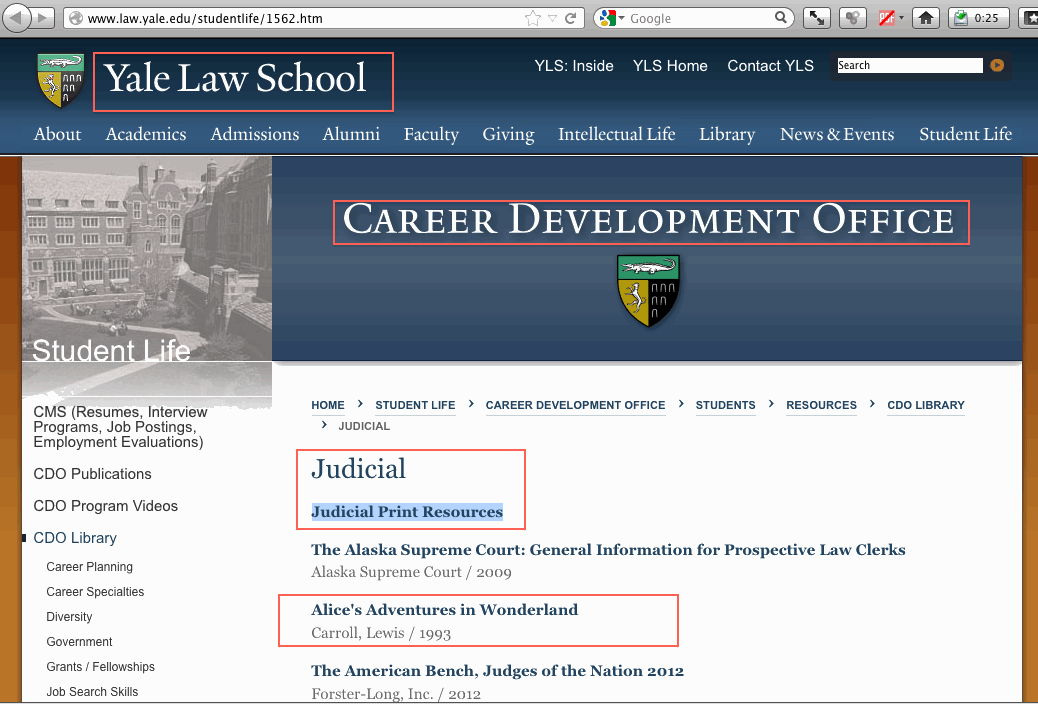

Statute Limitations? Kinda, Sorta, Sometimes or Nope
I just got asked again “is my action statute barred because it’s past the six month limitation period the statute Limitation Act lays out?”.
Yes. No. Maybe. You need to research your situation.
Are you smart? Are you gonna read the cover of a book and assume you understand the intricacies of the story?
Have you noticed good stories make you think one thing and then surprise you with a twist?
Law is kinda like a fiction story…
Think Alice In Wonderland (a book that is recommended reading for judges in training at Yale Law School… that’s a CLUE!) NOTE the original link in the image is not working, new link above.
The title of any Act sounds one way, reading it SEEMS to support it BUT there are exceptions or conditions that make the WHOLE ACT IRRELEVANT – to you the private person.
For example:
Ontario Limitations Act section 24 (3) and the Public Authorities Protection Act, RSO 1990 appears to limit/deny an action after 6 months (the action or limitation is irrelevant – its smoke and mirrors).
BUT, reading this decision below carfefully lays out that UNDER CERTAIN CIRCUMSTANCES the limitation period does not apply (kinda like how EVERY ACT under certain circumstances does not apply):
IN THIS CASE NO LIMITATION PERIOD (for this Act) APPLYS IF these conditions are met:
- The police officers acted OUTSIDE the scope of their duties (instant loss of protection of statute)
- The police officers acted with MALICE (instant loss of protection of statute)
- The plaintiff was SUFFERING from a psychological or other incapacity that would alleviate a limitation period. (sounds like common law harm?)
Here’s the case reference and the relevant paragraphs of this case:
MacKenzie v. Hamilton Police, 2011 ONSC 7371 (CanLII)
[67] I find that the action is statute barred in accordance with s. 24 (3) of the Limitations Act 2002 and by the operation of the six month limitation period contained in s. 7(1) of the P.A.P.A..
[68] I find that, even if the limitation period is rendered inapplicable by operation of s. 10(1) of the Limitation Act 2002, or for any other reason, the plaintiff has failed to establish his claim for assault, battery or any intentional infliction of bodily harm on a balance of probabilities.
Hopefully this is food for thought and makes sense and doesn’t require further explanation.
This is a principle (ie. there are always conditions that must be met) that applies to ALL statute law Acts.
Find the conditions and evidence they exist… and BOOM you win. Fail to do so means you lose.
There are conditions to get you into an Act and conditions to apply an Act to you and conditions to limit you or not.
Look for the conditions laid out INSIDE any Act AND in court decisions where a judge is providing his explanation of the relevant conditions and did the defendant or the plaintiff meet them…or not. Usually it is right there, plainly explained when you know what to look for.
Here’s another post on the concept – How To Win in Court Webinar Using Case Law
The purpose and effect of statutes of limitations are to protect defendants. There are three reasons for their existence:
1. A plaintiff with a valid cause of action should pursue it with reasonable diligence.
2. A defendant might have lost evidence to disprove a stale claim.
3. A long-dormant claim has more cruelty than justice.
4. Some crimes have no time limitations ie, fraud, murder
originally posted Aug 2013 – updated


agreed 100%
“It is my contention that if the so-called “court” had “disclosed” that it was operating in the capacity as a administrator of the undisclosed”
There is a “maxim in law” which states “Fraud Vitiates Everything”:
see the following –
https://famguardian.org/Subjects/Taxes/ChallJurisdiction/ThreeElements.htm
https://www.freedom-school.com/law/fraud-on-the-court-by-an-officer-of-the-court.html
https://assignments.uslegal.com/validity-of-assignments/fraudulent-inducement-and-validity/
http://annavonreitz.com/voidcontracts.pdf
It is my contention that if the so-called “court” had “disclosed” that it was operating in the capacity as a administrator of the undisclosed “corporation”(https://unitedstatesisabankruptcorporation.wordpress.com/tag/usc-title-28-section-3002-15-a/) and seeking your “strawman” corporate fiction “capitus dimuntis maximus” name due to the fact you broke some policy of the “corporation” then I would most agree with it. However, “they” Never make disclosure of this Fact and I consider that a form of Fraud/deciet (https://www.merriam-webster.com/dictionary/deceit) and Fraud is a crime. Fraud Vitates Everything it touches. Therefore, there is No “statute of limitaton” because it All was conceived in Fraud.